Podcast
Questions and Answers
What historical thinking skill involves analyzing and understanding a topic within a specific time and place?
What historical thinking skill involves analyzing and understanding a topic within a specific time and place?
- Contextualization (correct)
- Causation
- Continuity and Change over Time
- Comparison
Which of the following best describes the skill of comparison in historical thinking?
Which of the following best describes the skill of comparison in historical thinking?
- Presenting arguments based on historical evidence.
- Examining similarities and differences between societies or periods. (correct)
- Identifying the overarching themes in history.
- Assessing the impact of events on future occurrences.
What does the skill of causation encompass in the study of history?
What does the skill of causation encompass in the study of history?
- Focusing solely on the consequences of historical events.
- Tracking linear developments without acknowledging fluctuations.
- Only analyzing primary sources for understanding causes.
- Recognizing multiple possible causes and effects of historical events. (correct)
Which method is NOT suggested for effective study in this course?
Which method is NOT suggested for effective study in this course?
What is the primary focus of the skill labeled Continuity and Change over Time (CCOT)?
What is the primary focus of the skill labeled Continuity and Change over Time (CCOT)?
What does the theme of 'interaction between humans and the environment' primarily focus on?
What does the theme of 'interaction between humans and the environment' primarily focus on?
Which theme addresses the formation, growth, and decline of states and empires?
Which theme addresses the formation, growth, and decline of states and empires?
In AP World History, what is emphasized in the theme of 'systems of exchange'?
In AP World History, what is emphasized in the theme of 'systems of exchange'?
What skills are students expected to use when analyzing historical events?
What skills are students expected to use when analyzing historical events?
Which of the following is NOT a focus of the AP World History course?
Which of the following is NOT a focus of the AP World History course?
What time period does AP World History cover?
What time period does AP World History cover?
Which term describes the process through which different cultures share ideas and goods?
Which term describes the process through which different cultures share ideas and goods?
What does 'periodization' in AP World History help students understand?
What does 'periodization' in AP World History help students understand?
Flashcards
Contextualization
Contextualization
Placing a historical event within its specific time and place, considering its social, political, and cultural context.
Comparison
Comparison
Examining similarities and differences between historical events or societies to understand patterns, causes, and consequences.
Causation
Causation
Understanding the relationships between causes and effects in history, recognizing multiple factors and complex interactions.
Continuity and Change over Time (CCOT)
Continuity and Change over Time (CCOT)
Signup and view all the flashcards
Crafting Historical Arguments
Crafting Historical Arguments
Signup and view all the flashcards
What time period does AP World History cover?
What time period does AP World History cover?
Signup and view all the flashcards
What are the main themes in AP World History?
What are the main themes in AP World History?
Signup and view all the flashcards
What does contextualization in AP World History mean?
What does contextualization in AP World History mean?
Signup and view all the flashcards
Explain the "Interaction between Humans and the Environment" theme.
Explain the "Interaction between Humans and the Environment" theme.
Signup and view all the flashcards
Explain the "Development and Interaction of Cultures" theme.
Explain the "Development and Interaction of Cultures" theme.
Signup and view all the flashcards
Explain the "State-building, Expansion, and Conflict" theme.
Explain the "State-building, Expansion, and Conflict" theme.
Signup and view all the flashcards
Explain the "Creation, Expansion, and Interaction of Economic Systems" theme.
Explain the "Creation, Expansion, and Interaction of Economic Systems" theme.
Signup and view all the flashcards
Explain the "Systems of Exchange" theme.
Explain the "Systems of Exchange" theme.
Signup and view all the flashcards
Study Notes
Introduction to AP World History
- AP World History covers the history of the world from approximately 1200 BCE to the present.
- The course emphasizes key themes, like interaction between humans and the environment, the development and interaction of cultures, state-building, empires, and systems of exchange.
- Students analyze the causes and consequences of major historical changes and developments.
- The course emphasizes understanding historical context and using historical thinking skills.
- Students are expected to analyze primary and secondary sources, interpret historical data, and synthesize information from many perspectives.
- Students use contextualization (understanding a topic within its specific time and place), comparison, and cause and effect to analyze historical events.
Key Themes
- Interaction between humans and the environment: This theme explores how human societies have interacted with their surroundings throughout history, including aspects like agriculture, trade routes, and environmental changes.
- Development and interaction of cultures: This theme examines how societies shared ideas, goods, and religious beliefs, encompassing cultural exchange, conflict, and the development of distinct cultural identities. Examples: the spread of Buddhism and the transatlantic slave trade.
- State-building, expansion, and conflict: This theme focuses on the formation, growth, decline, and interactions of states and empires, including warfare and diplomacy. Concepts like legitimacy, sovereignty, and governance are pivotal.
- Creation, expansion, and interaction of economic systems: This theme includes various ways societies organized economic activity, from agricultural production to global trade networks and industrialization. This includes examining different economic systems like mercantilism, feudalism, and capitalism.
- Systems of exchange: This theme emphasizes the movement of goods, ideas, people, and religions across geographical boundaries, including trade, migration, and cultural diffusion.
Periodization
- Students must understand the historical periods covered in AP World History.
- The exam covers the major historical periods, divided into time periods to understand events' contexts, like the period from 1200 to 1450.
- The course covers roughly 1200 BCE to the present, highlighting significant historical developments. Knowing major turning points of each period (like the Neolithic Revolution, Renaissance, and Industrial Revolution) helps identify patterns and understand historical connections.
Historical Thinking Skills
- Contextualization: Students learn to analyze and understand any historical topic by placing it within its specific time and place.
- Comparison: Students analyze similarities and differences between different societies or periods to understand patterns, causes, and consequences.
- Causation: Understanding the causes and effects throughout history. Recognizing multiple possible causes and effects with historical complexity.
- Continuity and Change over Time (CCOT): Examining both enduring and transformative aspects of historical developments over time.
- Crafting Historical Arguments: Presenting logical arguments supported by historical evidence.
- Analyzing Historical Evidence: Critically interpreting historical events by analyzing primary and secondary sources.
Methodologies for studying
- Develop a consistent study schedule for success.
- Create flashcards to memorize key terms, people, and events.
- Utilize diagrams to visualize historical trends and processes.
- Design an organized study plan for focused study.
- Manage time effectively during study sessions.
- Utilize practice questions, practice exams, and feedback to identify areas for improvement.
Studying That Suits You
Use AI to generate personalized quizzes and flashcards to suit your learning preferences.




